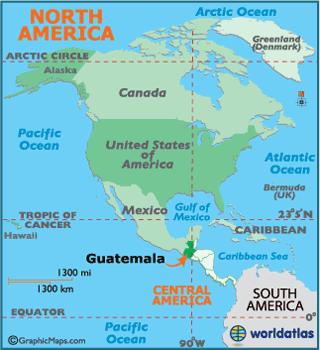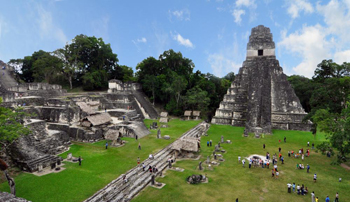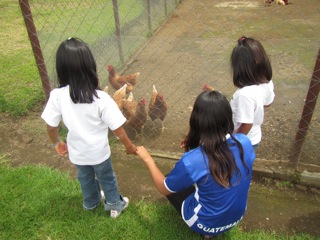Fearfully and Wonderfully Made:
A Mother-Daughter Trip to Guatemala
A guest essay by Beth Kawasaki. Beth earned her Masters of Arts in Theology from Fuller Theological Seminary and works on behalf of at risk children in Guatemala and other developing countries. She lives with her family in Northern California.
For Sunday September 8, 2013
Lectionary Readings (Revised Common Lectionary, Year C)
Jeremiah 18:1–11 or Deuteronomy 30:15–20
Psalm 139:1–6, 13–18 or Psalm 1
Philemon 1–21
Luke 14:25–33
This summer I traveled to Guatemala with my 11 year-old adopted daughter. It was Nohemi’s first trip back to her birth country since coming to her new home in California at the age of six months and joining her two older brothers. Nathan, our youngest child and Nohemi’s biological sibling, joined us four years later as we both benefited from and honored a hope expressed by their birth mother through the orphanage that we might keep them together.
Guatemala closed international adoptions in 2008 after allegations of irregularities, so the system could be reformed. Thousands of families and children were caught in legal and emotional limbo following this closure. US officials pledged diligent action on the 900 cases in process. After 5 years, as of July 2013, 89 of these children are still waiting in institutions and orphanages in Guatemala, including three children at Nohemi's orphanage.
 |
Guatemala is a fragile country of contradictions. On the one hand, it possesses extraordinary physical beauty and an exuberant cultural richness and history. Its ancient Mayan roots lend it a mysterious and significant place in the development of astronomy, calendaring, innovative agricultural practices, feats of engineering pre-machinery, and first written languages.
On the other hand, recovering from a brutal 36-year civil war[1] that ended with a peace accord signed on December 30, 1996, Guatemala has one of the highest homicide rates in the world, including rampant and unprosecuted violence against women, known as femicide; and the fourth highest rate of chronic malnutrition in the world, currently at 49.8% for children under 5[2] — despite being a leading agroexporter. Yet, the Huffington Post recently reported that despite its position just “above Iraq on the United Nations Human Development Index, a composite of life expectancy, education and per capita income”, it ranks seventh in the world in positive emotions according to a new Gallup poll.[3]
Into this complex milieu Nohemi and I traveled with a group of US and European families through an organization called TIES, which works to connect internationally adopted children to their countries, stories, and in many cases a birth parent, grandparent, sibling, or former foster care-taker. I had been to Guatemala many times post adoptions with my older children, leading service trips or with other NGO’s, leaving each time more attached to the place and people. In those groups we were transients and outsiders. This time I traveled as an adoptive Caucasian mother to a Guatemalteca daughter, fully aware of our obvious and potentially controversial status. I couldn't possibly predict or control what her reactions would be to her homeland, nor vice versa.
Nohemi is a dark skinned, petite, pre-teen of predominantly Mayan heritage. She's fluent in English and friendly in Spanish, and moves with the confidence and open posture of an all American kid. The bias she lives with is that everything is going to be great! And, with much credit to our Guatemalan trip leaders, it was.
 |
Tikal Mayan ruins Guatemala. |
Yet I also observed that Nohemi was a curiosity to the more prosperous and lighter skinned Central Americans staying in our hotels. There were several double takes when Nohemi and her adopted travel mates presumed equal status and space as a basic living right. While the indigenous peoples in Guatemala have made some social progress with increased representation in the legislative system and increased access to education, most still live in rural areas working as subsistence farmers. They are perceived as a different class of citizen with limited potential by the more privileged and powerful.
However, each day Nohemi interacted more freely and easily with the locals, whatever their status, and identified more positively with her heritage as she participated in environmental and humanitarian service projects conceived and led by strong national role models who looked like her.
Her worlds collided most dramatically during the two days we spent with the twenty-one children now permanently growing up at her former orphanage. There she served as an ambassador and bridge between the TIES traveling families and the resident children. I hung back as my daughter stood in front and introduced herself as “Michaela Nohemi Lucile Luna Ramos Kawasaki” — joining all of her names to all her story and coming full circle to where it all began. And she wants to return next summer so she can spend more time with her still orphaned "siblings" and study Spanish. God willing, I hope to make that happen.
In this week's lectionary from Psalm 139, the author sings out praises to an engaged, intimate, and present God who participates personally and creatively in the genesis and development of every human being.
God, investigate my life; get all the facts firsthand.
I’m an open book to you;
even from a distance, you know what I’m thinking.
You know when I leave and when I get back; I’m never out of your sight.
You know everything I’m going to say before I start the first sentence.
I look behind me and you’re there, then up ahead and you’re there, too — your reassuring presence, coming and going.
This is too much, too wonderful — I can’t take it all in!Oh yes, you shaped me first inside, then out; you formed me in my mother’s womb.
I thank you, High God — you’re breathtaking! Body and soul, I am marvelously made! I worship in adoration — what a creation!
You know me inside and out, you know every bone in my body;
You know exactly how I was made, bit by bit, how I was sculpted from nothing into something.
Like an open book, you watched me grow from conception to birth; all the stages of my life were spread out before you,
The days of my life all prepared before I’d even lived one day. ("The Message")
 |
Life at the orphanage. |
I don’t fully understand the complicated economy of God when it comes to at risk children in our own or developing countries. I do feel an urgent responsibility to Guatemala, a country that has given me much and a people with so much potential. This summer I was blessed and awed by my daughter’s growing understanding of and instinctual desire to be a part of this too.
LeDayne McLeese Polaski, an ethicist from Baylor University writes, “We must always be asking ourselves these questions: How do we order our personal and collective lives so that we allow for the unfolding of what God knitted together within our children, and the children of our churches, schools, and neighborhoods? How do we order our lives to encourage the unfolding of what God wove into children whom we will never know? What a tragic waste when we fail. What a great gift when we succeed. Fearful and wonderful indeed. Amen.”[4]
And Amen.
NOTES:
[1] Many Guatemalans I spoke with consider the term “civil war” a misnomer as the term doesn’t fully reveal the roles of the USA, Israel, and USSR in the perpetuation of, and financial and military backing of the war. For the December 30, 1996 transcript of the Online: News Hour announcement of the peace accord and “Guatemala’s Future” report by Jim Lehrer, please go to: http://www.pbs.org/newshour/bb/latin_america/december96/guatemala_12-30.html
[2] World Food Programme, Guatemala Overview, http://www.wfp.org/countries/guatemala
[3] Weissenstein, Michael. Happiest People on the Planet Live in Latin America, Gallup Poll Suggests, http://www.huffingtonpost.com/2012/12/20/happiest-people-on-planet-latin-america_n_2336772.html, December 19, 2012, and Clifton, Jon, Latin Americans Most Positive in the World, http://www.gallup.com/poll/159254/latin-americans-positive-world.aspx?ref=more, December 19, 2012.
[4] Polaski, LeDayne McLeese, Fearfully and Wonderfully Made, http://www.baylor.edu/christianethics/ChildrenarticlePolaski.pdf, The Center for Christian Ethics at Baylor University, 2003.
Image credits: (1) WorldAtlas.com; (2) Wikia Travel; and (3) Beth Kawasaki.





